Socrates (469-399 B.C.E.), a Greek philosopher and logician, significantly impacted ancient philosophy and influenced Plato.
Born to an Athenian sculptor, Socrates served in the Peloponnesian War and engaged with intellectuals like Zeno of Elea and Parmenides.
Socrates, known for his method of argumentation and influential thought process, never documented his own philosophies, leading to his life and teachings being interpreted from the works of Plato and Xenophon.
Despite his unattractive physical appearance and poverty, he attracted many followers, especially the youth of Athens, leading to his charge for corrupting youth and impiety.
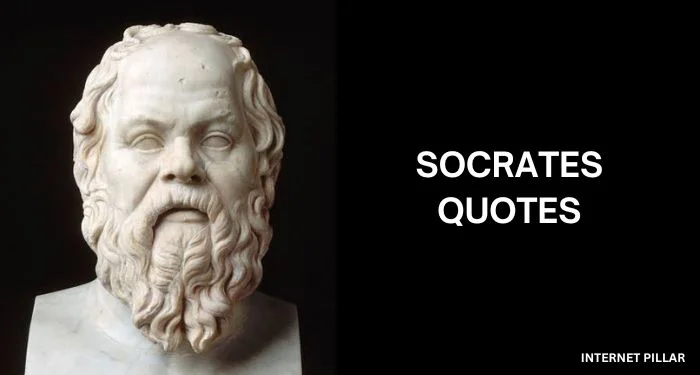
His trial ended in a death sentence, which he accepted, demonstrating his commitment to Athenian law.
Related: Buddha Quotes and Marcus Aurelius Quotes.
His philosophical contributions, particularly his emphasis on self-awareness and truth-seeking, continue to resonate through time, primarily via Plato, the Cynics and indirectly, Aristotle.
In this article I have compiled the best quotes from Socrates.
Best Socrates Quotes On Life

1. “The secret of change is to focus all of your energy, not on fighting the old, but on building the new.” – (Socrates).

2. “To find yourself, think for yourself.” – (Socrates).
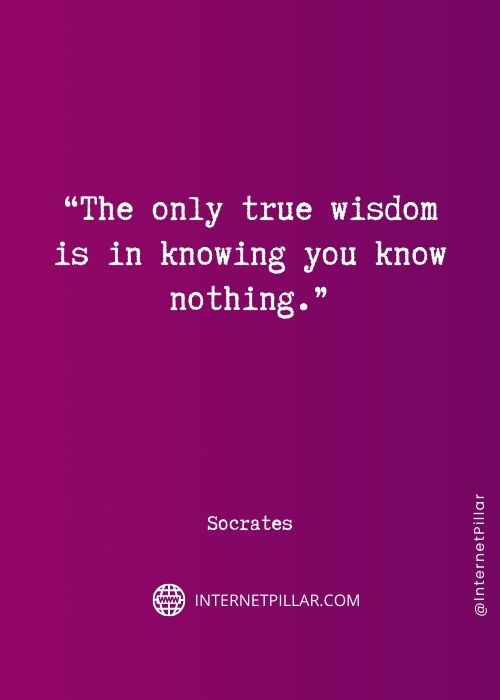
3. “The only true wisdom is in knowing you know nothing.” – (Socrates).
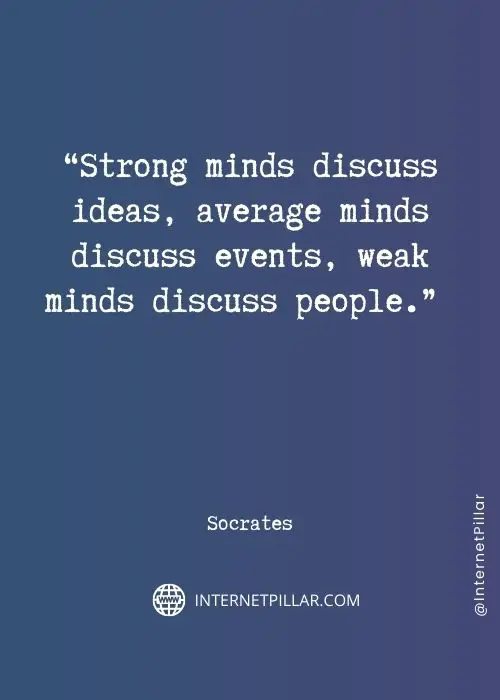
4. “Strong minds discuss ideas, average minds discuss events, weak minds discuss people.” – (Socrates).

5. “Be kind, for everyone you meet is fighting a hard battle.” – (Socrates).
6. “The unexamined life is not worth living.” – (Socrates).
7. “Wonder is the beginning of wisdom.” – (Socrates).
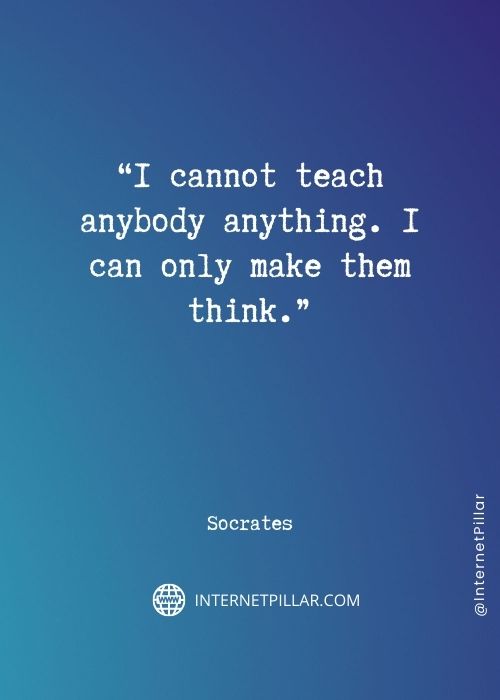
8. “I cannot teach anybody anything. I can only make them think.” – (Socrates).
9. “No man has the right to be an amateur in the matter of physical training. It is a shame for a man to grow old without seeing the beauty and strength of which his body is capable.” – (Socrates).
10. “There is only one good, knowledge, and one evil, ignorance.” – (Socrates).
11. “Contentment is natural wealth, luxury is artificial poverty.” – (Socrates).
Top Socrates Quotes
12. “The secret of happiness, you see, is not found in seeking more, but in developing the capacity to enjoy less.” – (Socrates).
13. “Know thyself.” – (Socrates).
14. “What screws us up the most in life is the picture in our head of what it’s supposed to be.” – (Socrates).
15. “Education is the kindling of a flame, not the filling of a vessel.” – (Socrates).
16. “When the debate is lost, slander becomes the tool of the loser.” – (Socrates).
17. “Be as you wish to seem.” – (Socrates).
18. “The easiest and noblest way is not to be crushing others, but to be improving yourselves. ” – (Socrates).
19. “Prefer knowledge to wealth, for the one is transitory, the other perpetual.” – (Socrates).
20. “We cannot live better than in seeking to become better.” – (Socrates).
21. “I only know one thing, and that is I know nothing.” – (Socrates).
22. “Smart people learn from everything and everyone, average people from their experiences, stupid people already have all the answers.” – (Socrates).
23. “Silence is a profound melody, for those who can hear it above all the noise.” – (Socrates).
24. “Wisdom is knowing how little we know.” – (Socrates).
25. “There is no learning without remembering.” – (Socrates).
26. “Why should we pay so much attention to what the majority thinks?” – (Socrates).
27. “Every action has its pleasures and its price.” – (Socrates).
28. “Do not be angry with me if I tell you the truth.” – (Socrates).
Famous Socrates Quotes
29. “We can easily forgive a child who is afraid of the dark; the real tragedy of life is when men are afraid of the light.” – (Socrates).
30. “I am a Citizen of the World, and my Nationality is Goodwill.” – (Socrates).
31. “A multitude of books distracts the mind.” – (Socrates).
32. “The years wrinkle our skin, but lack of enthusiasm wrinkles our soul.” – (Socrates).
33. “Our lives are but specks of dust falling through the fingers of time. Like sands of the hourglass, so are the days of our lives.” – (Socrates).
34. “Do not go through life like leaf blown from here to there believing whatever you are told.” – (Socrates).
35. “Only the knowledge that comes from inside is the real Knowledge.” – (Socrates).
36. “Be the kind of person that you want people to think you are.” – (Socrates).
37. “To be uncertain is to be uncomfortable, but to be certain is to be ridiculous.” – (Socrates).
38. “I shall never fear or avoid things of which I do not know…” – (Socrates).
39. “Envy is the ulcer of the soul.” – (Socrates).
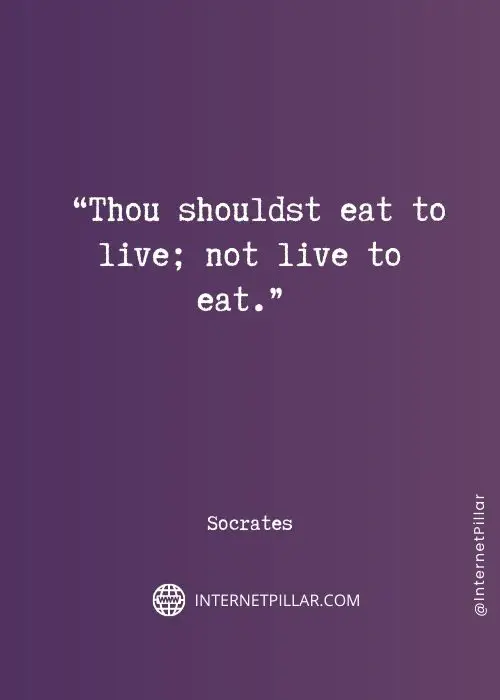
40. “Thou shouldst eat to live; not live to eat.” – (Socrates).
41. “To know, is to know that you know nothing. That is the meaning of true knowledge. For a man who claims to have the knowledge, while actually knowing nothing, is less smarter than you, who claim to know nothing.” – (Socrates).
Powerful Socrates Quotes
42. “Knowledge is our ultimate good.” – (Socrates).
43. “Better to do a little well, then a great deal badly.” – (Socrates).
44. “The fewer our wants the more we resemble the Gods.” – (Socrates).
45. “Be true to thine own self.” – (Socrates).
46. “Sometimes you put walls up not to keep people out, but to see who cares enough to break them down.” – (Socrates).
47. “Do not grieve over someone who changes all of the sudden. It might be that he has given up acting and returned to his true self.” – (Socrates).
48. “Death may be the greatest of all human blessings.” – (Socrates).
49. “I know you won’t believe me, but the highest form of Human Excellence is to question oneself and others.” – (Socrates).
50. “Wisest is he who knows he knows not.” – (Socrates).
51. “The more I learn, the less I realize I know.” – (Socrates).
52. “Neither I nor any other man should, on trial or in way, contrive to avoid death at any cost.” – (Socrates).
53. “Wisdom begins in wonder.” – (Socrates).
54. “He who is not contented with what he has, would not be contented with what he would like to have.” – (Socrates).
55. “True knowledge exists in knowing that you know nothing. And in knowing that you know nothing, that makes you the smartest of all.” – (Socrates).
56. “Understanding a question is half an answer.” – (Socrates).
57. “Either I do not corrupt the young or, if I do, it is unwillingly.” – (Socrates).
58. “When you want success as badly as you want the air, then you will get it. There is no other secret of success.” – (Socrates).
59. “All things in moderation, including moderation.” – (Socrates).
60. “Falling down is not a failure. Failure comes when you stay where you have fallen.” – (Socrates).
61. “One thing I know, that I know nothing. This is the source of my wisdom.” – (Socrates).
62. “I know nothing except the fact of my ignorance.” – (Socrates).
63. “Pride divides the men, humility joins them.” – (Socrates).
64. “Athletics have become professionalized.” – (Socrates).
65. “Talk in order that I may see you.” – (Socrates).
66. “To be is to do.” – (Socrates).
67. “If you want to be wrong then follow the masses.” – (Socrates).
68. “Beloved Pan and all ye other gods who haunt this place, give me beauty in the inward soul; and may the outward and the inward man be one.” – (Socrates).
69. “I am a fool, but I know I’m a fool and that makes me smarter than you.” – (Socrates).
70. “I know that I am intelligent because I know that I know nothing.” – (Socrates).
Wise Socrates Quotes
71. “I swear it upon Zeus an outstanding runner cannot be the equal of an average wrestler.” – (Socrates).
72. “Do it because it’s in your heart. Not because you want something in return. Employ your time in improving yourself by other men’s writings, so that you shall gain easily what others have labored hard for.” – (Socrates).
73. “In every person there is a sun. Just let them shine.” – (Socrates).
74. “It is better to suffer an injustice than to commit one.” – (Socrates).
75. “By all means marry; if you get a good wife, you’ll become happy; if you get a bad one, you’ll become a philosopher.” – (Socrates).
76. “Man must rise above the Earth – to the top of the atmosphere and beyond – for only thus will he fully understand the world in which he lives.” – (Socrates).
77. “By far the greatest and most admirable form of wisdom is that needed to plan and beautify cities and human communities.” – (Socrates).
78. “Let the questions be the curriculum.” – (Socrates).
79. “If what you want to tell me is neither True nor Good nor even Useful, why tell it to me at all.” – (Socrates).
80. “True wisdom comes to each of us when we realize how little we understand about life, ourselves, and the world around us.” – (Socrates).
81. “The greatest way to live with honor in this world is to be what we pretend to be.” – (Socrates).
82. “To move the world we must move ourselves.” – (Socrates).
83. “From the deepest desires often come the deadliest hate.” – (Socrates).
84. “Trust not a woman when she weeps, for it is her nature to weep when she wants her will.” – (Socrates).
85. “Be slow to fall into friendship, but when you are in, continue firm and constant.” – (Socrates).
86. “I am a citizen, not of Athens, or Greece, but of the world.” – (Socrates).
87. “An honest man is always a child.” – (Socrates).
88. “All thinking begins with wondering.” – (Socrates).
89. “Four things belong to a judge: to hear courteously, to answer wisely, to consider soberly, and to decide impartially.” – (Socrates).
90. “Worthless people live only to eat and drink; people of worth eat and drink only to live.” – (Socrates).
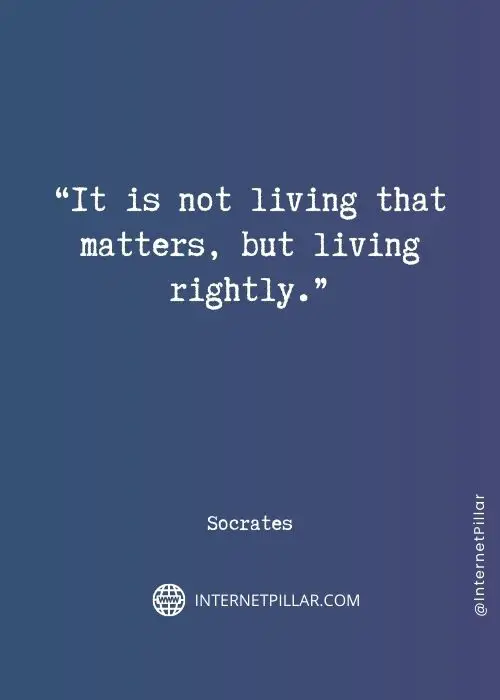
91. “It is not living that matters, but living rightly.” – (Socrates).
92. “The beginning of wisdom is a definition of terms.” – (Socrates).
93. “Sometimes you have to let go to see if there was anything worth holding onto.” – (Socrates).
94. “He is the richest who is content with the least.” – (Socrates).
95. “You never know a line is crooked unless you have a straight one to put next to it.” – (Socrates).
96. “When our feet hurt, we hurt all over.” – (Socrates).
97. “Beauty comes first. Victory is secondary. What matters is joy.” – (Socrates).
98. “What a lot of things I don’t need.” – (Socrates).
99. “Bad men live that they may eat and drink, whereas good men eat and drink that they may live.” – (Socrates).
100. “Our prayers should be for blessings in general, for God knows best what is good for us.” – (Socrates).
101. “The perfect human being is all human beings put together, it is a collective, it is all of us together that make perfection.” – (Socrates).
102. “Death offers mankind a full view of truth.” – (Socrates).
103. “Beware the barrenness of a busy life.” – (Socrates).
104. “He is a man of courage who does not run away, but remains at his post and fights against the enemy.” – (Socrates).
105. “All men’s souls are immortal, but the souls of the righteous are immortal and divine.” – (Socrates).
106. “The hour of departure has arrived and we go our ways; I to die, and you to live. Which is better? Only God knows.” – (Socrates).
107. “The really important thing is not to live, but to live well. And to live well meant, along with more enjoyable things in life, to live according to your principles.” – (Socrates).
Insightful Socrates Quotes
108. “The misuse of language induces evil in the soul.” – (Socrates).
109. “If one knows what is right, he will do it; nobody wants to be evil.” – (Socrates).
110. “It is a disgrace to grow old through sheer carelessness before seeing what manner of man you may become by developing your bodily strength and beauty to their highest limit.” – (Socrates).
111. “Once made equal to man, woman becomes his superior.” – (Socrates).
112. “The greatest blessing granted to mankind come by way of madness, which is a divine gift.” – (Socrates).
113. “Are you not ashamed of your eagerness to possess as much wealth, reputation, and honors as possible, while you do not care for nor give thought to wisdom or truth, or the best possible state of your soul?” – (Socrates).
114. “What a lot of things there are a man can do without.” – (Socrates).
115. “It is best and easiest not to discredit others but to prepare oneself to be as good as possible.” – (Socrates).
116. “I soon realized that poets do not compose their poems with knowledge, but by some inborn talent and by inspiration, like seers and prophets who also say many fine things without any understanding of what they say.” – (Socrates).
117. “Ordinary people seem not to realize that those who really apply themselves in the right way to philosophy are directly and of their own accord preparing themselves for dying and death.” – (Socrates).
118. “Happiness is unrepented pleasure.” – (Socrates).
119. “The right way to begin is to pay attention to the young, and make them just as good as possible.” – (Socrates).
120. “Creation is man’s immortality and brings him nearest to the gods.” – (Socrates).
121. “True perfection is a bold quest to seek. Only the willing and true of heart will seek the betterment of many.” – (Socrates).
122. “Get not your friends by bare compliments but by giving them sensible tokens of your love.” – (Socrates).
123. “See one promontory, one mountain, one sea, one river and see all.” – (Socrates).
124. “As to marriage or celibacy, let a man take which course he will, he will be sure to repent.” – (Socrates).
125. “The hardest task needs the lightest hand or else its completion will not lead to freedom but to a tyranny much worse than the one it replaces.” – (Socrates).
126. “Nobody knows anything, but I, knowing nothing, am the smartest man in the world.” – (Socrates).
127. “Think not those faithful who praise all thy words and actions, but those who kindly reprove thy faults.” – (Socrates).
128. “All of the wisdom of this world is but a tiny raft upon which we must set sail when we leave this earth. If only there was a firmer foundation upon which to sail, perhaps some divine word.” – (Socrates).
129. “Obscurity is dispelled by augmenting the light of discernment, not by attacking the darkness.” – (Socrates).
130. “Some have courage in pleasures, and some in pains: some in desires, and some in fears, and some are cowards under the same conditions.” – (Socrates).
131. “The life of which meaning one never ponders is not worth living.” – (Socrates).
132. “There is a doctrine whispered in secret that a man is a prisoner who has no right to open the door and run away; this is a great mystery which I do not quite understand.” – (Socrates).
133. “Whatever authority I may have rests solely on knowing how little I know.” – (Socrates).
134. “In every one of us there are two ruling and directing principles, whose guidance we follow wherever they may lead; the one being an innate desire of pleasure; the other, an acquired judgment which aspires after excellence.” – (Socrates).
135. “You will know that the divine is so great and of such a nature that it sees and hears everything at once, is present everywhere, and is concerned with everything.” – (Socrates).
136. “How can you wonder your travels do you no good, when you carry yourself around with you?” – (Socrates).
137. “Fellow citizens, why do you burn and scrape every stone to gather wealth and take so little care of your children to whom you must one day relinquish all?” – (Socrates).
138. “The greater the power that deigns to serve you, the more honor it demands of you.” – (Socrates).
139. “The end of life is to be like unto God; and the soul following God, will be like unto Him; He being the beginning, middle, and end of all things.” – (Socrates).
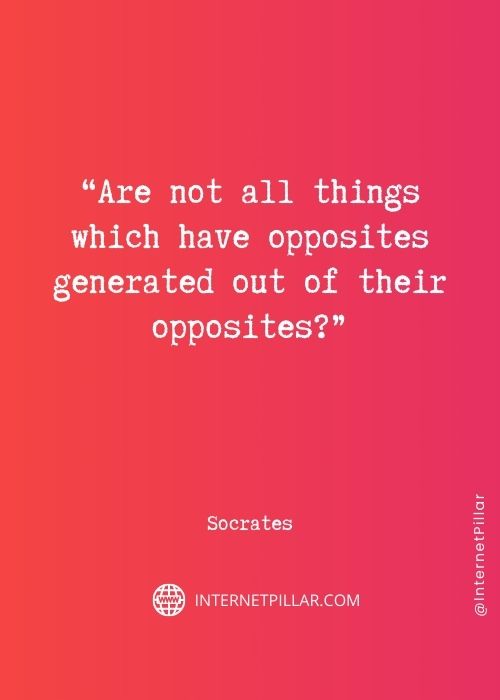
140. “Are not all things which have opposites generated out of their opposites?” – (Socrates).
Meaningful Socrates Quotes
141. “The tongue of a fool is the key of his counsel, which, in a wise man, wisdom hath in keeping.” – (Socrates).
142. “Though flattery blossoms like friendship, yet there is a vast difference in the fruit.” – (Socrates).
143. “It seems that God took away the minds of poets that they might better express His.” – (Socrates).
144. “Malice drinketh up the greater part of its own poison.” – (Socrates).
145. “Our purpose in founding the city was not to make any one class in it surpassingly happy, but to make the city as a whole as happy as possible.” – (Socrates).
146. “I have good hope that there is something remaining for the dead.” – (Socrates).
147. “It has been shown that to injure anyone is never just anywhere.” – (Socrates).
148. “To use words and phrases in an easygoing manner without scrutinizing them too curiously is not in general a mark of ill-breeding. On the contrary, there is something low-bred in being too precise. But sometimes there is no help for it.” – (Socrates).
149. “I only wish that ordinary people had an unlimited capacity for doing harm; then they might have an unlimited power for doing good.” – (Socrates).
150. “Living or dead, to a good man there can come no evil.” – (Socrates).
151. “I pray Thee, O God, that I may be beautiful within.” – (Socrates).
152. “The soul, like the body, accepts by practice whatever habit one wishes it to contact.” – (Socrates).
153. “No man has a right to be an amateur in the matter of physical training.” – (Socrates).
154. “Follow the argument wherever it leads.” – (Socrates).
155. “Anybody can be a hellene, by his heart, his mind, his spirit…” – (Socrates).
156. “The best seasoning for food in hunger; for drink, thirst.” – (Socrates).
157. “If the whole world depends on today’s youth, I can’t see the world lasting another 100 years.” – (Socrates).
158. “The nearest way to glory a shortcut, as it were is to strive to be what you wish to be thought to be.” – (Socrates).
159. “If you would seek health, look first to the spine.” – (Socrates).
160. “Nothing is to be preferred before justice.” – (Socrates).
161. “Be of good hope in the face of death. Believe in this one truth for certain, that no evil can befall a good man either in life or death, and that his fate is not a matter of indifference to the gods.” – (Socrates).
162. “One who is injured ought not to return the injury, for on no account can it be right to do an injustice.” – (Socrates).
163. “This sense of wonder is the mark of the philosopher. Philosophy indeed has no other origin.” – (Socrates).
164. “Not life, but good life, is to be chiefly valued.” – (Socrates).
165. “I decided that it was not wisdom that enabled poets to write their poetry, but a kind of instinct or inspiration, such as you find in seers and prophets who deliver all their sublime messages without knowing in the least what they mean.” – (Socrates).
Popular Socrates Quotes
166. “The heart of the person before you is a mirror. See there your own form.” – (Socrates).
167. “I don’t care what people say about me. I do care about my mistakes.” – (Socrates).
168. “What is happening to our young people? They disrespect their elders, they disobey their parents. They ignore the law. They riot in the streets inflamed with wild notions. Their morals are decaying. What is to become of them?” – (Socrates).
169. “In all of us, even in good men, there is a lawless wild-beast nature, which peers out in sleep.” – (Socrates).
170. “The understanding of mathematics is necessary for a sound grasp of ethics.” – (Socrates).
171. “There is no solution; seek it lovingly.” – (Socrates).
172. “Virtue does not come from wealth, but wealth, and every other good thing which men have comes from virtue.” – (Socrates).
173. “People learn more on their own rather than being force fed.” – (Socrates).
174. “Remember, no human condition is ever permanent. Then you will not be overjoyed in good fortune nor too scornful in misfortune.” – (Socrates).
175. “The shortest and surest way to live with honor in the world, is to be in reality what we would appear to be, all human virtues increase and strengthen themselves by the practice and experience of them.” – (Socrates).
176. “To know, is to know that you know nothing.” – (Socrates).
177. “Be of good cheer about death and know this as a truth, that no evil can happen to a good man, either in life or after death.” – (Socrates).
178. “He who is unable to live in society, or who has no need because he is sufficient for himself, must be either a beast or a god.” – (Socrates).
179. “Living well and beautifully and justly are all one thing.” – (Socrates).
180. “You are wrong, sir, if you think that a man who is any good at all should take into account the risk of life or death; he should look to this only in his actions, whether what he does is right or wrong, whether he is acting like a good or a bad man.” – (Socrates).
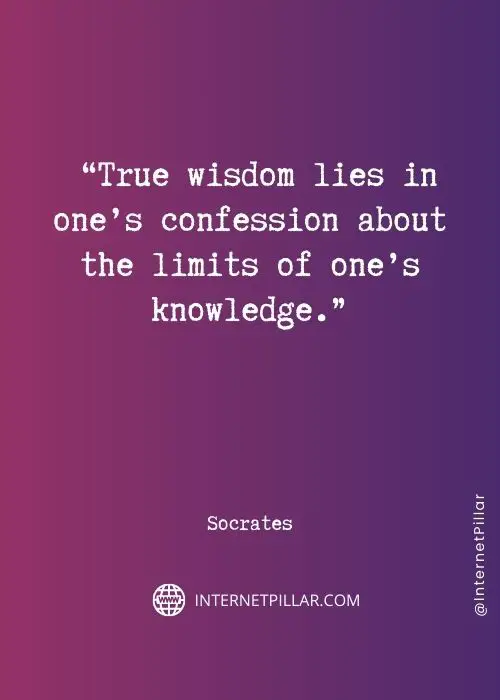
181. “True wisdom lies in one’s confession about the limits of one’s knowledge.” – (Socrates).
182. “Improve yourself by other men’s writings thus attaining effortlessly what they acquired through great difficulty.” – (Socrates).
183. “The body cannot be cured without regard for the soul.” – (Socrates).
184. “Man’s life is like a drop of dew on a leaf.” – (Socrates).
185. “How many things are there which I do not want.” – (Socrates).
186. “The first key to greatness is to be in reality what we appear to be.” – (Socrates).
187. “Fear of women love more than hate the man.” – (Socrates).
188. “Fame is the perfume of heroic deeds.” – (Socrates).
189. “The difficulty, my friends, is not in avoiding death, but in avoiding unrighteousness; for that runs faster than death.” – (Socrates).
190. “In childhood be modest, in youth temperate, in adulthood just, and in old age prudent.” – (Socrates).
191. “Children today are tyrants. They contradict their parents, gobble their food, and tyrannize their teachers.” – (Socrates).
192. “Those who want the fewest things are nearest to the gods.” – (Socrates).
193. “There is no possession more valuable than a good and faithful friend.” – (Socrates).
194. “Just as you ought not to attempt to cure eyes without head or head without body, so you should not treat body without soul.” – (Socrates).
195. “There is no difference between knowledge and temperance; for he who knows what is good and embraces it, who knows what is bad and avoids it, is learned and temperate.” – (Socrates).
196. “The comic and the tragic lie inseparably close, like light and shadow.” – (Socrates).
197. “I prefer to be refuted than to refute, for it is a greater good for oneself to be freed from the greatest evil than to free another.” – (Socrates).
198. “How can you call a man free when his pleasures rule over him.” – (Socrates).
199. “Where there is reverence there is fear, but there is not reverence everywhere that there is fear, because fear presumably has a wider extension than reverence.” – (Socrates).
200. “Only the extremely ignorant or the extremely intelligent can resist change.” – (Socrates).
201. “It is better to make a mistake with full force of your being than to carefully avoid mistakes with a trembling spirit.” – (Socrates).
You Might Like
- Mother Teresa Quotes
- William Shakespeare Quotes
- Abraham Lincoln Quotes
- Kobe Bryant Quotes
- Mahatma Gandhi Quotes
- Ronald Reagan Quotes
- Nelson Mandela Quotes
- Thomas Jefferson Quotes
Short Biography of Socrates
Socrates, an influential Greek philosopher from Athens, is seen as a cornerstone of Western philosophy, especially in ethics.

Despite leaving no written works, his ideas live on through the dialogues of his students, like Plato and Xenophon.
Known for his unique method of exploring topics through questions and answers, Socrates’s approach sparked the creation of the Socratic method.
| Full Name | Socrates |
| Born | c. 470 BC Deme Alopece, Athens |
| Died | 399 BC (aged approximately 71) Athens |
| Cause of death | Forced suicide by poisoning |
| Spouse(s) | Xanthippe, Myrto (disputed) |
| Children | Lamprocles, Menexenus, Sophroniscus |
| Family | Sophroniscus (father), Phaenarete (mother), Patrocles (half-brother) |
| Era | Ancient Greek philosophy |
| Region | Western philosophy |
| School | Classical Greek philosophy |
| Notable students | Plato, Xenophon, Antisthenes, Aristippus, Alcibiades, Critias |
| Main interests | Epistemology, ethics, teleology |
| Notable ideas | Social gadfly, Socratic dialogue, Socratic intellectualism, Socratic irony, Socratic method, Socratic paradox, Socratic questioning, “The unexamined life is not worth living” |
His life ended controversially in 399 BC when he was executed for allegedly misleading the youth and disrespecting the gods.
Plato’s accounts of Socrates’s teachings highlight his method of inquiry and his famous admission of his own ignorance, emphasizing that recognizing our lack of knowledge is the first step toward wisdom.
Quick Facts about Socrates
- Socrates, born around 469 BCE in Athens, is a cornerstone of Western philosophy.
- The Oracle at Delphi named Socrates the wisest in Athens, sparking his quest for knowledge.
- Plato, Socrates’ notable pupil, preserved his teachings through dialogues.
- Socrates championed the art of critical thinking through engaging dialogue.
- He used Socratic irony, pretending to be ignorant to expose others’ argument flaws.
- Socrates critiqued the Sophists for their deceptive rhetoric.
- His famous quote, “I know that I know nothing,” highlights his philosophical humility.
- Accused of impiety and corrupting youth, Socrates faced serious charges in Athens.
- His 399 BCE trial showcased his unwavering dedication to his principles.
- Condemned to death, Socrates accepted his fate by drinking poison hemlock.
- Socrates’ approach to inquiry deeply influenced Western thought and education.
- Through Plato’s writings, we gain insight into Socratic philosophy.
- The Socratic method, a tool for critical thinking, involves deep questioning to uncover assumptions.
- Socratic ignorance emphasizes the wisdom in recognizing one’s lack of knowledge.
- Socrates advocated for justice and ethical conduct in society.
- He famously stated that an unexamined life is not worth living, encouraging self-reflection.
- Socrates’ philosophical legacy continues to inspire across centuries.
- His life journey, from stonemason to influential thinker, highlights his intellectual evolution.
- Socrates’ method of questioning encourages logical reasoning in education today.
- His trial and subsequent death symbolize the cost of standing by one’s beliefs.
- Socrates’ dialogues with Plato serve as a foundational text in philosophy.
- His confrontation with the Sophists showcased his disdain for manipulative speech.
- Socrates’ teachings urge individuals to seek truth and self-awareness.
- His life’s work was dedicated to exploring ethical and philosophical questions.
- Socrates’ influence on Plato paved the way for the latter’s philosophical contributions.
- The concept of Socratic irony teaches the value of questioning in revealing truth.
- Socrates’ paradox underscores the importance of intellectual humility.
- His socio-political views stress the individual’s role in fostering a just society.
- The enduring impact of Socrates is evident in ongoing scholarly discussions.
- His story, from a humble beginning to becoming a philosophical icon, remains compelling.
Top Questions about Socrates
A: Socrates, hailing from Athens and living circa 470–399 BCE, stands as a pivotal figure in Western philosophy. Dubbed the “Father of Western Philosophy,” he initiated the ethical tradition of thought and profoundly influenced subsequent philosophical frameworks.
A: Socrates is celebrated for his foundational role in shaping ancient Greek philosophy, which subsequently laid the groundwork for all Western philosophy. His methodologies and ethical inquiries remain central to philosophical discourse.
A: Socratic questioning is a dialectical method introduced by Socrates, characterized by a series of probing questions. This technique aims to foster critical analysis, challenge preconceived notions, and uncover deeper truths through dialogue.
A: Despite acknowledging the reasons behind Socrates’ contentious reputation, Plato greatly admired him. He recognized Socrates’ philosophical contributions while also conceding to some extent Socrates’ alleged impiety and influence on the youth.
A: Indeed, Socrates was condemned to death through the ingestion of poison hemlock, after being accused of corrupting the minds of the youth and espousing unconventional religious ideas.
A: Socrates is often hailed as the founding father of Western philosophy, owing to his significant and enduring contributions to the field, despite the mysteries surrounding his life and work.
A: Among Socrates’ distinguished students was Plato, who is notable for his extensive philosophical dialogues that frequently featured Socrates as a central figure, thereby immortalizing his mentor’s teachings.
A: The Socratic method is an educational approach that employs a sequence of strategic questions designed to engage learners in deep thinking and reasoning, aiming to ignite intellectual curiosity and foster an active pursuit of knowledge.